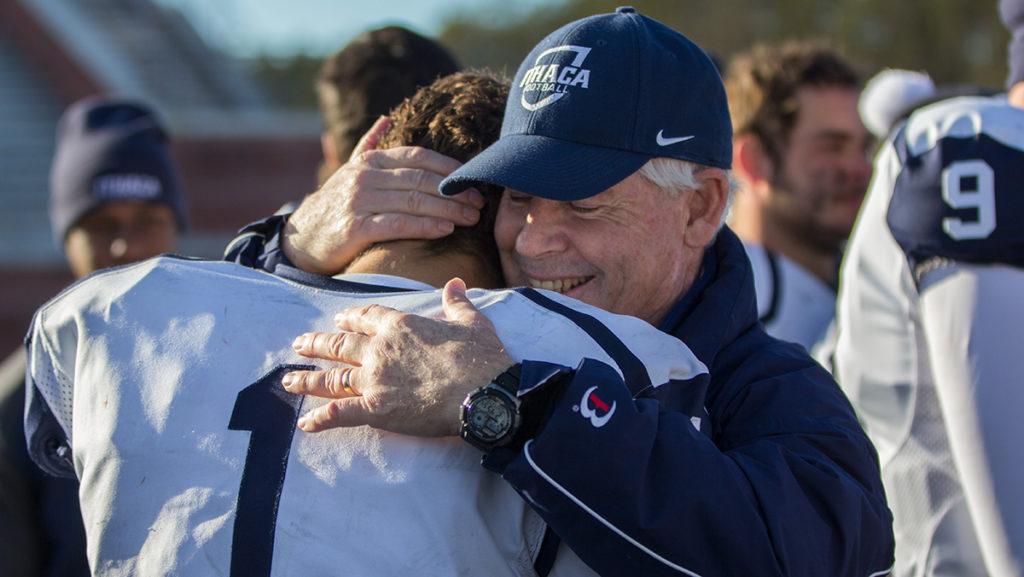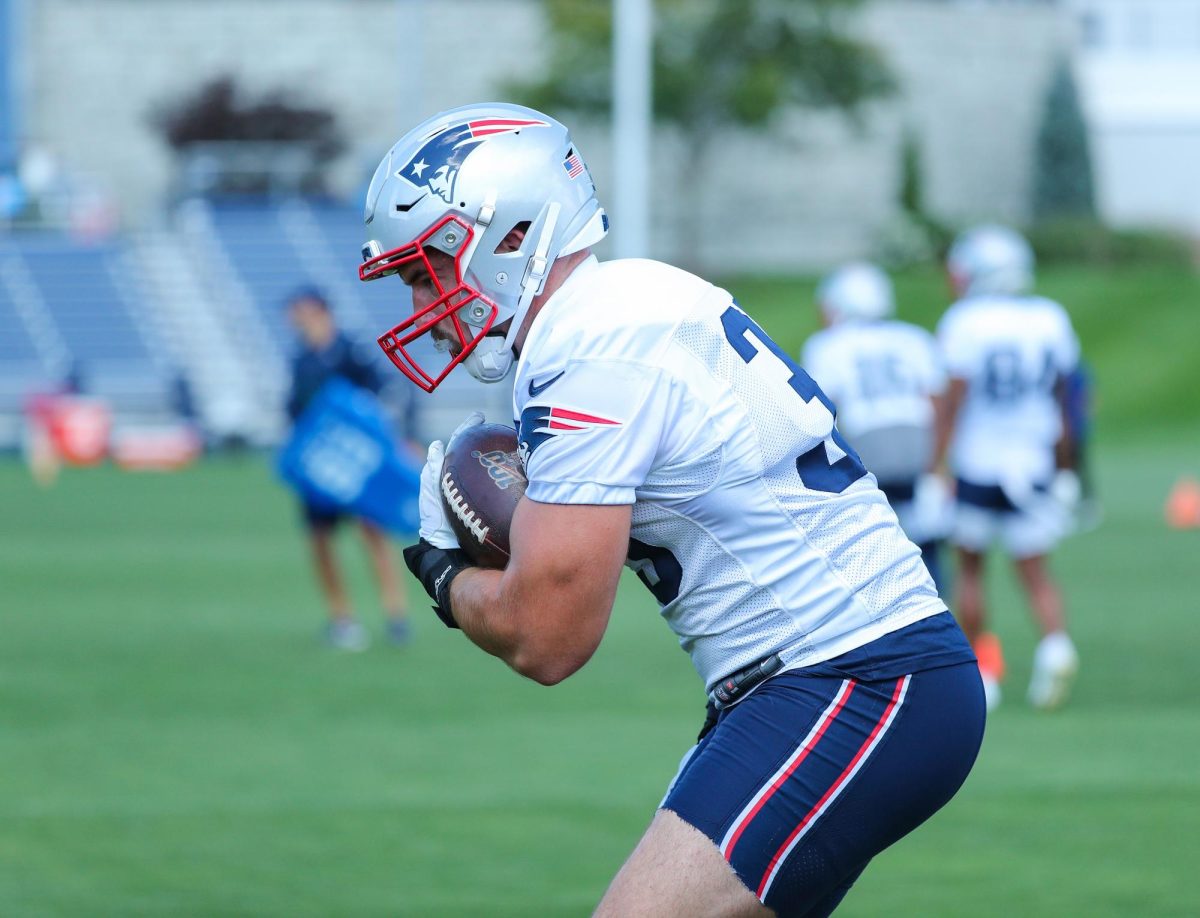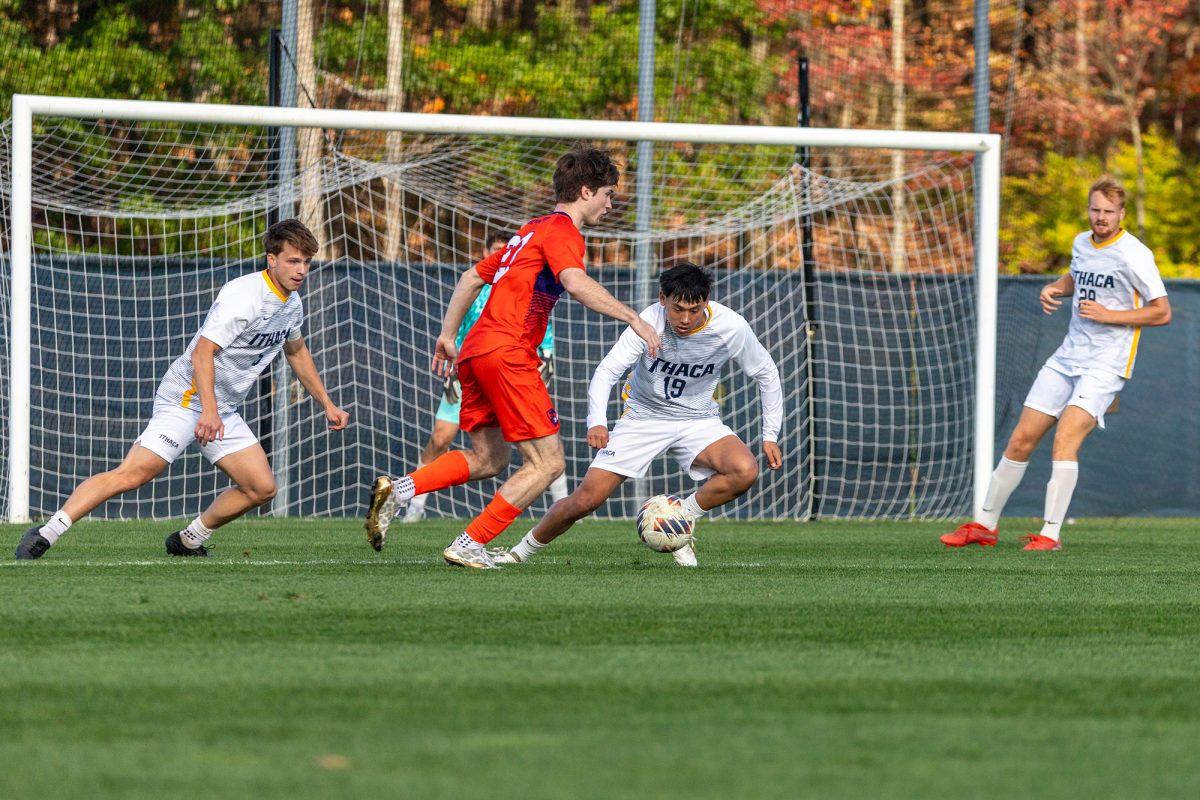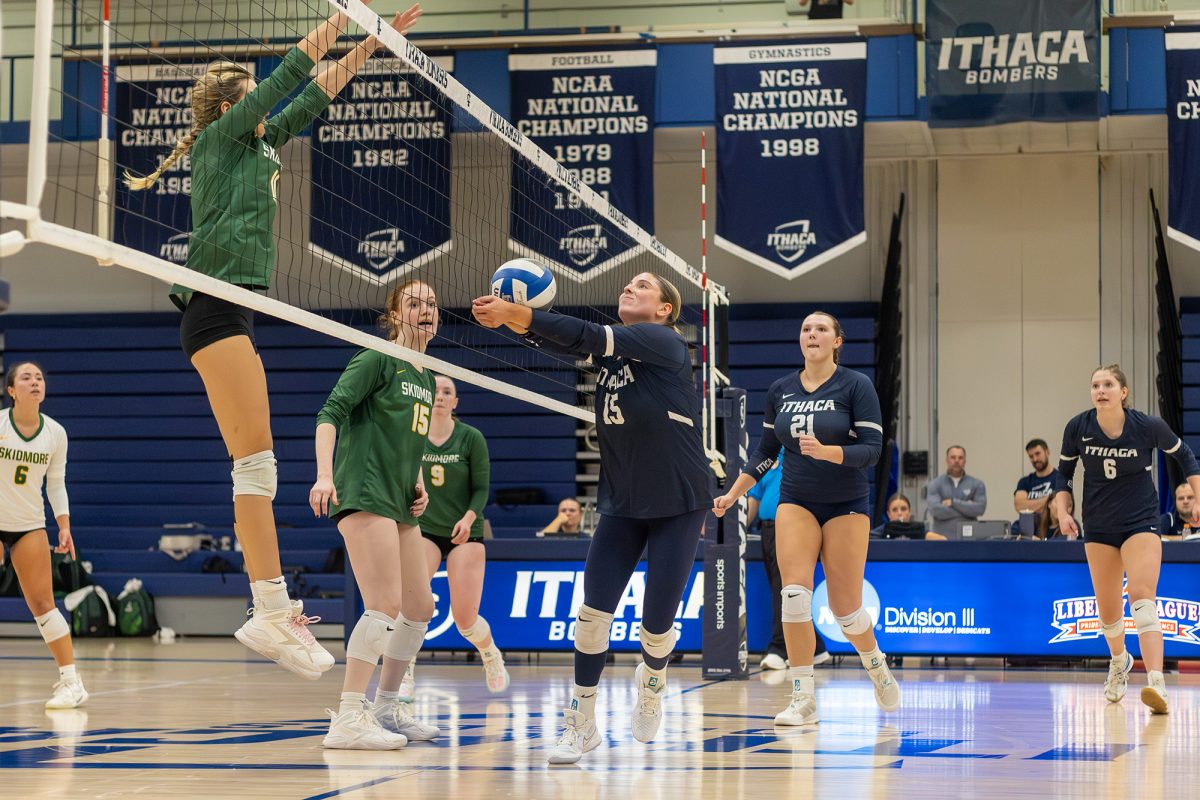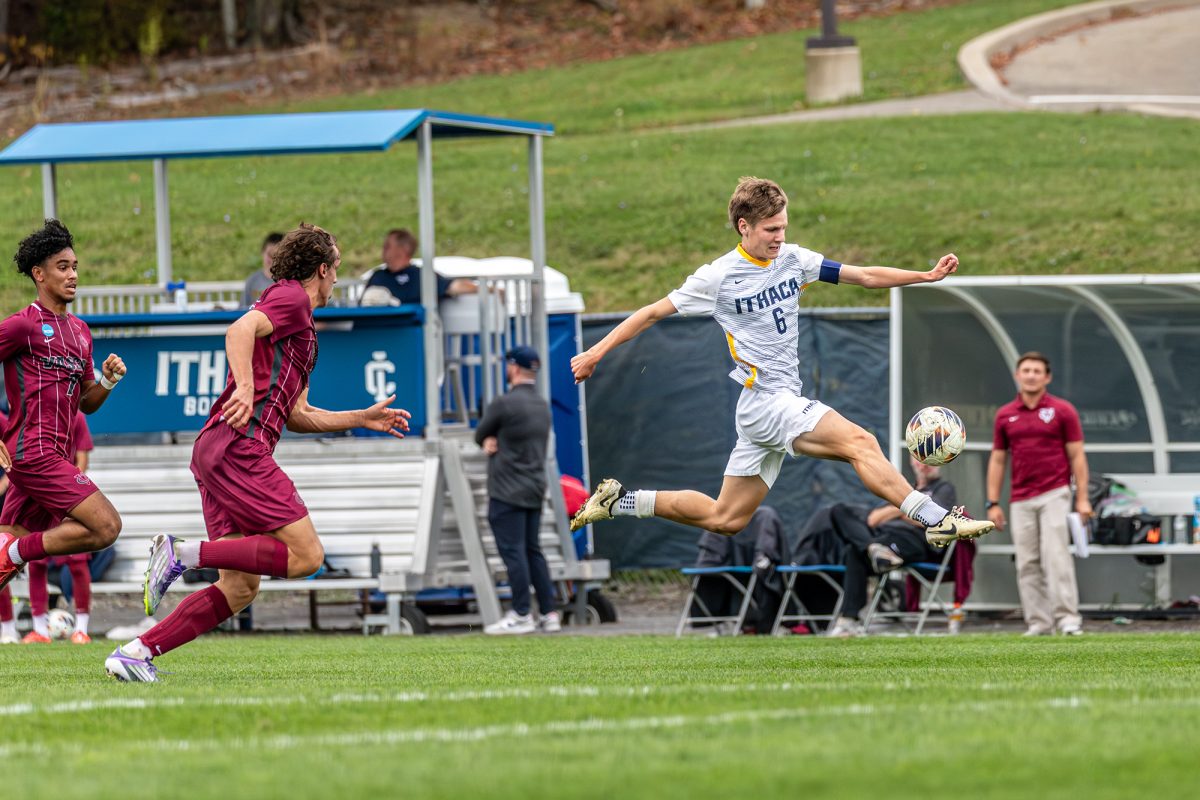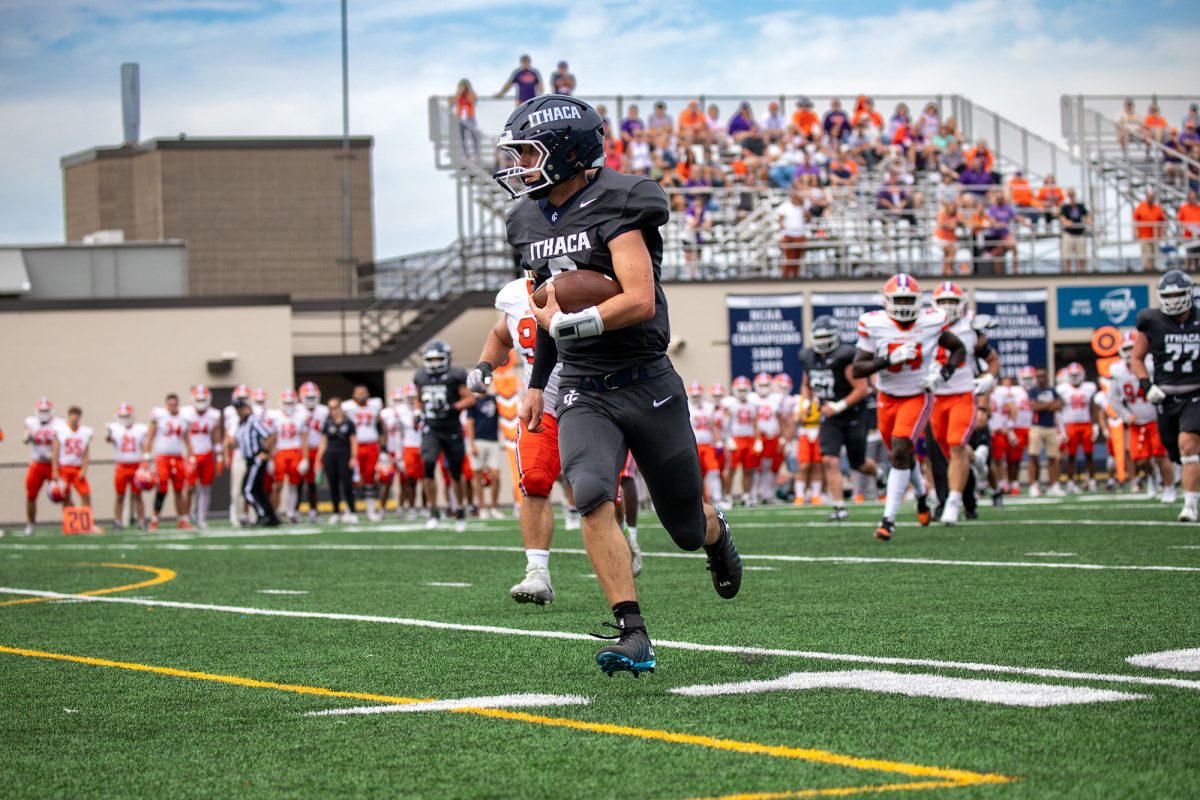With no time left on the clock and his team on the wrong side of the scoreboard, Ithaca College football head coach Mike Welch ’73 stood on the field at the SUNY Cortland Stadium Complex with a heavy heart.
After suffering a devastating 28–16 loss in the 58th annual Cortaca Jug, Welch delivered his last postgame speech to a crowd of heartbroken, teary-eyed football players.
As his family and the media waited eagerly, he took the time to hug each of his players, leaving each with one final message of how much he cares about them, before he exited the field for the final time.
I take a sincere interest in each one of them because they are like sons to me. I had an individual message for each kid because moments like this don’t come very often, so I wanted to tell them how much I felt about them. This wasn’t easy for them, so hopefully I softened the blow a little.” [citation] — Mike Welch [/citation]
During his 23 years as head coach, Welch has accumulated a 169–78 overall record with eight NCAA playoff appearances. Over his total 33 seasons on the Bombers’ coaching staff, he owns a 258–93 record.
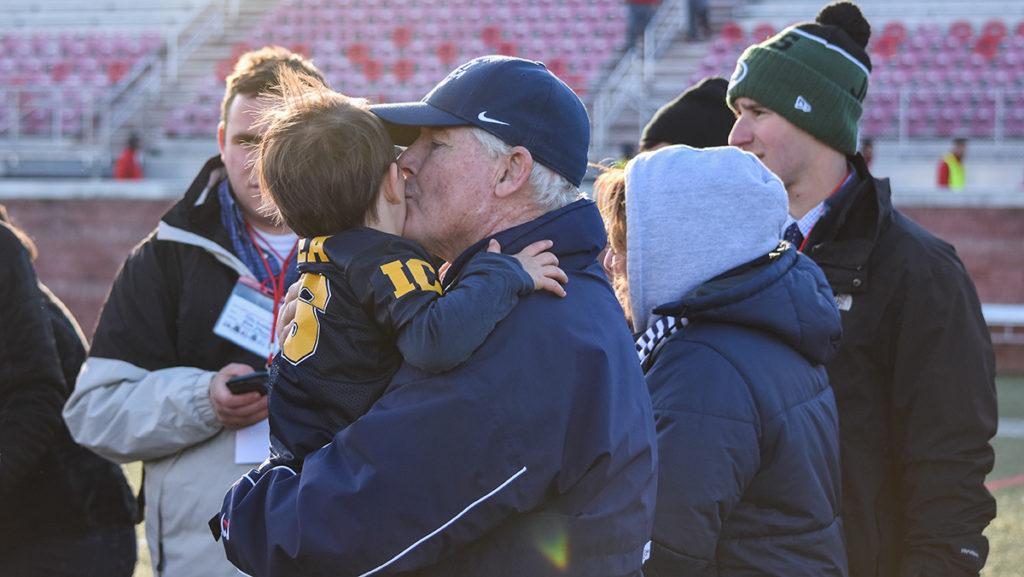
On Aug. 10, Welch announced he would retire at the conclusion of the 2016 season. In an interview following the announcement, he said the decision was tough to make but decided it was the right time to step away.
“I’m at the twilight of my career, and it seemed like the right time for my family and for me,” Welch said at the time. “I’m healthy, and things are good, and I have a nice group coming back and a real nice staff.”
Welch’s wife, Susan, who graduated from the college in 1973 as well, said the past 23 years have been nothing short of great but that it was time for the two to move on.
“It’s a little emotional right now,” she said. “We’re both Ithaca alums, so it makes it even better. Our kids are alumni. It’s been a good ride. We had a lot of fun, and we are ready for phase two of our lives.”
Junior linebacker Kenny Bradley said having Welch as a coach has shaped the way he treats people for the better.
“He’s a class act,” Bradley said. “He teaches you not only how to be a better football player but how to be a better person and for how to be a better man. He’s an overall good person who shows you how to treat people with respect.”
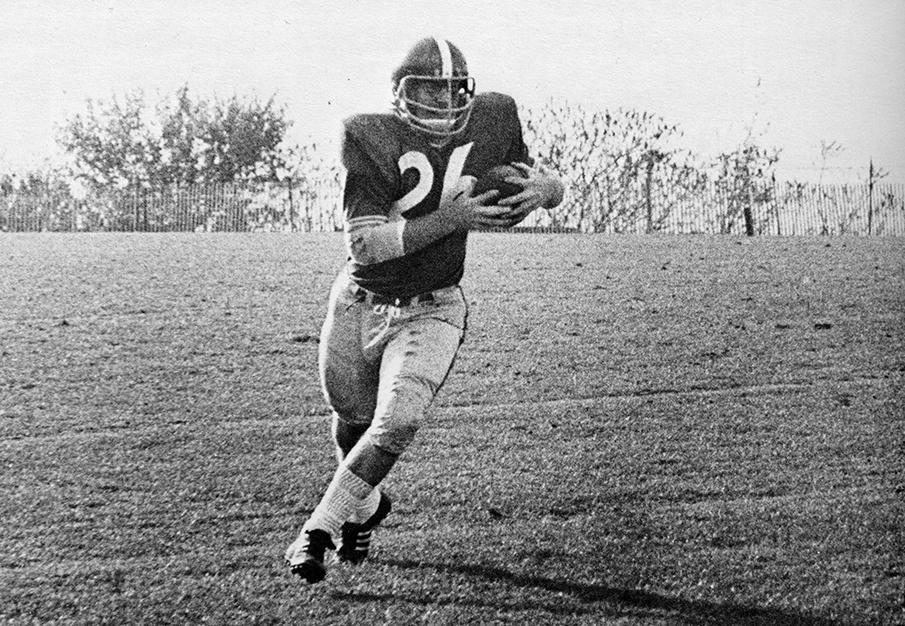
Welch graduated in 1973 from the college, where he played for the Bombers under former head coach Jim Butterfield. As a senior, he started as a fullback and was named captain. He said that the moment that he became captain was a highlight of his playing career.
“I was never a superstar,” he said. “I had to work really, really hard to compete and eventually earn a starting position on the football team. I did that for three years, and it wasn’t easy. I didn’t play many times, but I hung in there. I think my teammates respected that, so I felt that was pretty incredible my senior year, to do that.”
Welch was also a member of the men’s lacrosse team for four years. As a physical education major at the college, he was required to participate on two athletic teams. He was on the junior varsity team his first two years then moved up to varsity as a junior and became a starting midfielder.
“I really got treated with lacrosse,” he said. “Especially as a running back, you carry the ball, and people try to knock you down, and I said, ‘I can handle that,’ or knock somebody else down. It was a very physical game back then, not so much the finesse you see now.”
Following graduation, Welch served as an assistant coach at Rush-Henrietta High School in Rochester, New York, until 1976. He then got a graduate assistantship at the University at Albany, where he earned his master’s degree in education in 1977. He coached alongside Bob Ford, who Welch said was one of the greatest college football coaches of all time.
I fell in love with college coaching. I just loved it. I really learned a lot about goal setting and knowing that maybe I could do a little bit more than just high school level.” [citation] — Mike Welch [/citation]
Welch eventually worked his way up and was named the offensive back coach and later the defensive line coach for Ford.
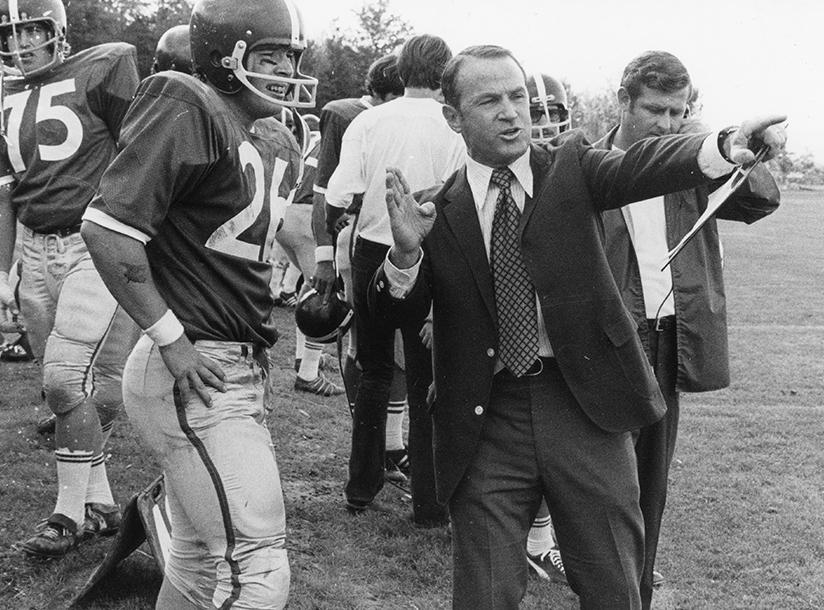
From 1980–84, Welch served as the offensive coordinator at Washington University in St. Louis. Before the 1984 season, he received a call from Butterfield to inform him of an open position as an assistant coach at the college.
“I don’t know if I even answered him,” Welch said. “I just hung up and applied. It was a dream come true. I never thought of getting that opportunity to come back to your alma mater to coach.”
He returned to the college in 1984 as the linebacker coach and was a part of two NCAA Championship teams in 1988 and 1991.
Butterfield retired after the 1993 season, and the opportunity to apply for the head coach position opened up. Welch said he was fortunate to be chosen for the position following the legacy of Butterfield.
Since 2002, when the first football Empire 8 Championship was held, Welch has led the team to six Empire 8 Conference championships.
Welch missed the final four games of the 2012 season, including Cortaca, due to heart bypass surgery. Defensive Coordinator Mark McDonough assumed head coaching duties during Welch’s absence.
In 2015, Welch was inducted into the Ithaca College Athletic Hall of Fame. He also earned the 2016 Outstanding Contribution to Amateur Football award from the National Football Foundation and the College Football Hall of Fame.
Along with Welch’s accomplishments on the field, former starting quarterback Tom Dempsey ’15 said Welch’s integrity and leadership skills are what made him so successful.
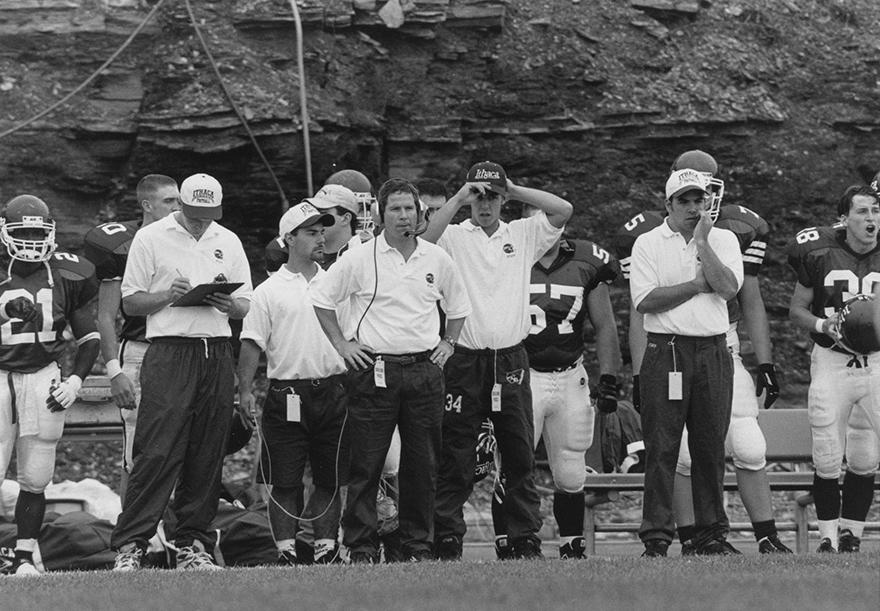
“He’s a man of his word and really practices what he preaches, which is an important virtue for anyone, but especially someone whose job it is to teach and lead a team,” Dempsey said.
Jamie Free ’05 played under Welch from 2001–04. He said Welch was always calm and was meant to be in a leadership role.
“Before I even stepped foot on the field, he switched me from linebacker to fullback,” Free said. “He knew what was going to work. I was one of three four-year lettermen in my class because of that change. He did what was needed to make sure the machine was well–oiled and running. He was the driver. He knew where we needed to go.”
Senior quarterback Wolfgang Shafer said Welch not only spent his coaching career teaching his players how to be better football players but that he also gave them life lessons that would help them on and off the gridiron.
“There were some times when I would get a little ahead of myself and put a lot on my shoulders, and I would go to him in his office,” Shafer said. “We would shut the door, and he would calm me down and tell me that I have to live each day as if it’s my last. The way he’s been able to instill that in me and the rest of my teammates is what’s going to stay with me for the rest of my life.”
Dempsey said his greatest lesson from Welch was that not everything needs to be perfect the first time as long as he made adjustments from what he did wrong.
“My biggest takeaway that has helped me both in football and elsewhere is that it’s OK to make mistakes,” Dempsey said. “He made it very clear to us quarterbacks that he wanted us to go out on the practice field and throw an interception so that we could learn from what we did wrong. He would always say it’s OK to make mistakes as long as you don’t make them more than once.”
Alex Hill ’04 was a junior when his father was diagnosed with cancer. In his senior year, the Bombers had a game against Springfield College, and his father was able to attend despite his condition. At the end of the game, Welch handed Hill’s father a football and jersey signed by every player on the team without Hill’s knowing.
Two days later, Hill’s father died, and Welch flew to Hill’s hometown in Gloucester, Massachusetts, to attend the funeral.
Before Welch’s arrival in Gloucester, he had every player reach out to Hill and leave voicemails on his phone.
It made everything OK for me because I knew that while I was losing a piece of my family, I had this huge family back in Ithaca to go home to, even after my father passed, because Coach Welch created that family.” [citation] — Alex Hill [/citation]
When recruits came to visit the college, Welch would use a signature line during their first sit-down meeting with him, Bradley said. It was one he said he’ll always remember.
“When you’re on your recruiting visit, you go into his office, and he’ll sit back in his chair, recline a little bit, interlock his hands and ask, ‘So you ready to be a Bomber?’” Bradley said. “Everyone I’ve talked to on the team has said this happened to them.”
Senior defensive end Rob Barbieri said another part of Welch’s recruiting pitch that struck him was how he communicated his vision for the program.
“On my recruiting visit, he explained to me what this football program is about, what Ithaca College is about and what he wants his players to get out of the program,” Barbieri said. “That first impression spoke volumes to me to the type of man he is and to the type of program he wants to run, and it was a big part of the reason I came to Ithaca.”
[acf field=”code1″]
Despite leading a serious and professional football program, Dempsey said, Welch understood how to keep the mood light when necessary and showed his players his sense of humor when he felt it appropriate.
“One day during training camp of my junior year, we were instructed to go to the swimming pool,” Dempsey said. “We were a bunch of crazy football players, and we didn’t know what we were getting into, and the first thing we saw was coach lying in the middle of the water on a float saying, ‘Come on in — the water is nice.’”
Senior defensive end Peter Trathen said Welch continued to surprise the players after they arrived at the pool.
“Once we got to the pool, everyone started chanting for coach to do a belly flop,” Trathen said. “I’m looking at him, thinking there’s no way he’s going to do it, and the next thing I know, he rips off his shirt, gets on the diving board, gets everybody pumped up and proceeds to do the best belly flop I have ever seen.”
Bradley said Welch even managed to be funny in the middle of practice.
“We were doing neck stretches at practice, and he just stepped in front of me and says, ‘Come on, Bradley, work that pencil neck,’ and just started laughing in front of me,” Bradley said.
Dan MacNeill, Cortland football head coach, who has spent 20 seasons at the helm of the Red Dragons, said Welch’s impact goes way beyond the South Hill.
“His legacy not only at Ithaca but in the game of football is going to be lasting,” MacNeill said. “I just want to thank him for doing what he’s done for so long. He’s defined Cortland, defined Ithaca and defined the game of football.”
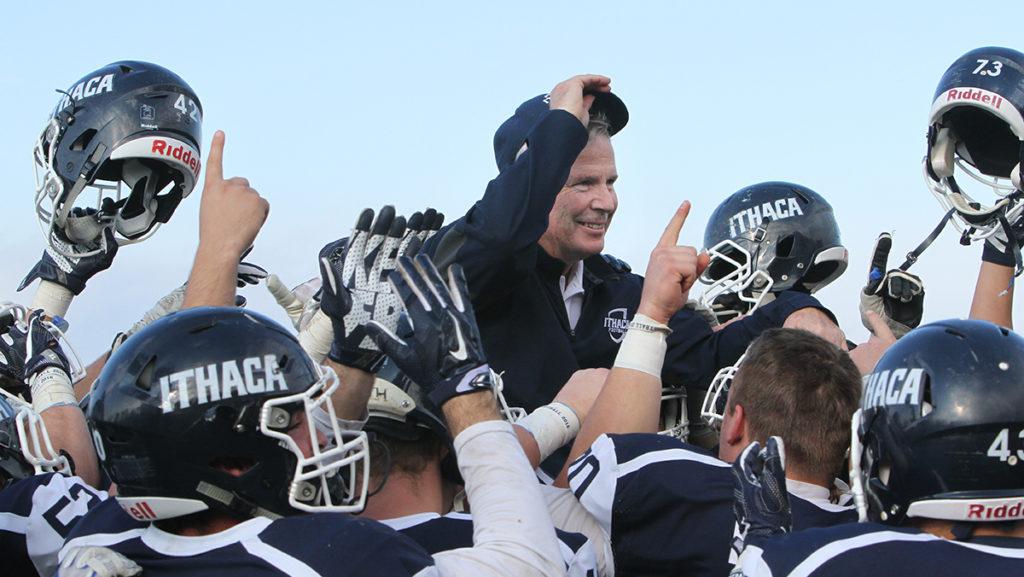
Shafer said he does not believe Welch will know how appreciative he is of everything Welch has done for him.
“I just want to thank him for giving me a shot to live my dream because growing up, all I ever wanted to do was play college football,” Shafer said. “Getting able to be a leader and start for two years under a guy like him — I don’t think he’ll ever understand what it means to me.”
The search for the program’s 10th head coach is underway, and a new head coach will be announced in the middle of December.
As his 23 years as head coach and 37 seasons on the Bomber field comes to an end, the 65-year-old coach said he is thankful to have had an opportunity to play and coach at the college.
“This is a very sought–after job,” Welch said. “It is, I think, still one of the best jobs in the country just because the beauty of the school and the academic reputation. The athletic tradition we have here is a phenomenal place to work and coach.”


